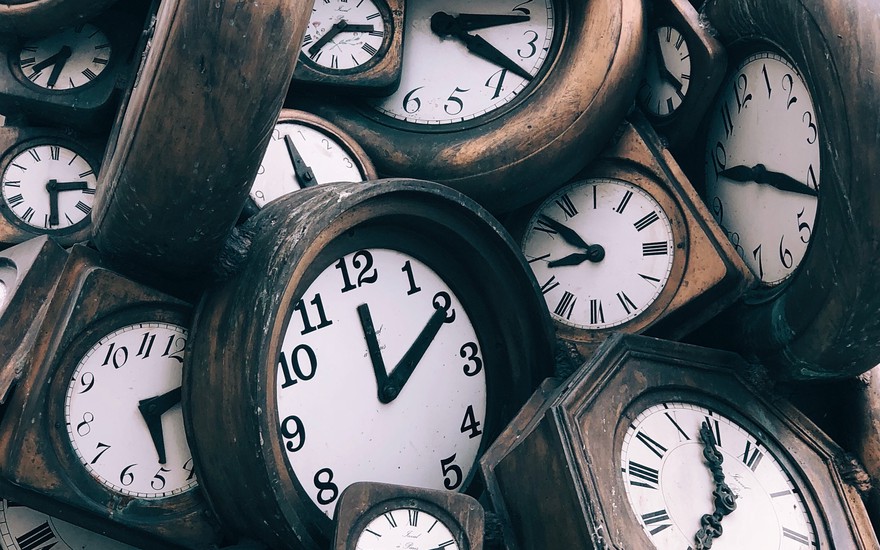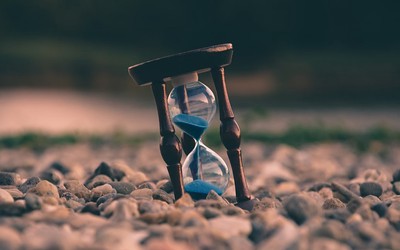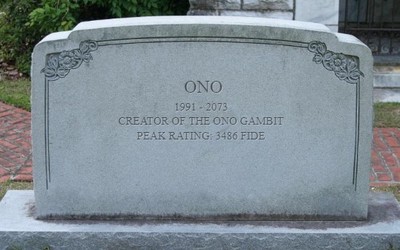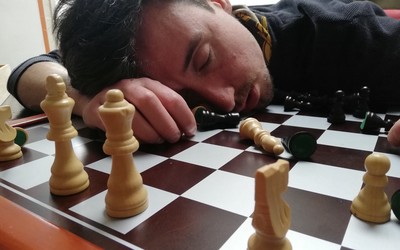
Going Incremental
Many Adult Improvers face an insurmountable opponent when it comes to chess time management: death.On a happier note, this blog post isn’t about the point at which our rating graph and life expectancy curve collide. It’s about actual time trouble - my own time trouble, and how a brilliant article by fellow blogger FM Nate Solon got me on the right track.
In fact, my issue is fixed.
It took a long time, a lot of trial and error and a great deal of introspection. And so now I share with you what worked for me in this post.
Let me help you out with your chess issues in a free trial lesson. You can book it here.
The Problem
I have always been aware that I play too slowly. Or at least I have been aware that I play more slowly than everyone in the universe. I didn’t need data to check this. I would say that I was behind on the clock in 90% or more of my games.
Things were that bad.
In many of those games I was significantly behind on the clock. I often found myself playing on the increment when my opponent had half or more of their time left. I even noticed (once I started seeing it as a problem) that I was “incre-mental” before move 30. I will note this is almost always in 15/10 and 30/30 games - the time controls I predominantly play here on Lichess.
Denial
Oddly I never really thought my time issues were really an issue at all. If it was something I stopped to consider, I would brush it off thinking: "surely I will speed up as I get better".
At times, my lack of time was even something I spun in a positive way: "hey, I’d rather lose on time than develop bad habits and blunder", I told myself.
But that is a ridiculous thing to say. That is just my own ego saying: "yeah I would have won that game if I wasn’t in time trouble". But that’s the point. I was in time trouble. And I was losing. I wasn’t ready to admit I had a problem.

It wasn’t until my trusty old chess pal Andrew pointed out to me he had heard that "being behind on the clock is often the same as being down a piece" that I had a sort of awakening - maybe I did have a problem that needed to be solved.
After that (and a healthy dose of introspection), I finally admitted I had an issue in my game that I really needed to solve.
Treating The Symptom
So you know how I went about solving it? This is genuinely embarrassing, so bear with me: I tried to get good at blitz.
The idea was that if I could stop entering a time-induced blunder panic then it wouldn’t matter if I was on the increment by move 7.
Fast forward a couple of weeks after my decision.
Before I started playing blitz, my chess training routine saw me sitting outside like a disciplined monk at 5am going through endgame strategy books with my board and pieces, doing diligent calculation exercises with a notebook, taking breaks to do Wim Hof breathing exercises and morning meditations, before a rapid or classical training game.
Fast forward a week into my blitz training and now at 5am you’ll find I haven’t gone to bed yet, I’m slouched on the couch in my underpants, tanning bottles of IPA, listening to Nirvana at full volume and ploughing through 5+3 games like there is no tomorrow.
There is so much wrong with this that I don’t even know where to start. First of all, the time-induced blunder panic that I feel in my rapid and classical training games wasn’t something I really felt in my blitz training. Because honestly, I don’t care about my blitz rating the way I do my rapid and classical ratings. I don't see it as a measure of my strength, so I wasn’t feeling anywhere near the same pressure as I do in my classical games when I get down to the increment. Secondly, I was drunk. So I wasn’t feeling much pressure anyway.
Frankly if my house caught fire I would have probably just shrugged it off and kept playing. And finally (and most importantly), even if I cared about the results, even if I analysed every game - it would still be the wrong thing to do. Why?
Because I was trying to fix the symptom rather than finding the cause.
Weirdly the blitz had some value. I actually found that I wasn’t panicking quite as much as I used to under the increment in my rapid and classical games - even without the numbing effects of alcohol. But that wasn’t stopping me from blundering eventually.
Whether or not I got better at blitz was irrelevant. When my opponent had 10 minutes and I had 10 seconds I was going to slip up. I had to forget the symptom and treat the cause.
I had to stop getting into time trouble in the first place.
Adult Improver Chess Coaching | Book your Free Trial Lesson | Support the Blog on Patreon
Treating The Cause
And that is where FM Nate Solon’s article comes in. I’m not going to re-write his piece, so you should go and read it. I followed the advice in that article by breaking it down into mini goals.
I wasn’t going to take all of the advice at once. I started by giving myself an opening quota of around 20% of my total game time. I had to get out of the opening with roughly 25 minutes left on my clock in my 30+30 games and 12 minutes left in my 15+10 rapid games.
Now, I am aware these don’t match mathematically but whatever, close enough. That's what I chose and it worked for me. It took me about a month of being really disciplined. But by focusing on that as my main goal each game, I started to hit those targets pretty consistently.
I was never losing games in the opening and when I played the opening quicker, guess what? I still wasn’t losing games in the opening. I will say that this was not true in the Lichess Lonewolf and 45/45 Leagues, where my lack of opening knowledge (and lack of time to prepare) is still a pretty big issue, but in the random pool on Lichess, nobody can prepare for you, and I wasn’t being hurt there. There were some teething issues, as there are whenever you try to turn knowledge (in this case the knowledge of time quotas) into skill.
I’ll admit I played a few moves a bit too quickly to begin with and failed to be flexible with my opening time quota when things got complicated early. But I was doing well and it felt good to not be going into the middlegame already down a massive amount on the clock.
Oddly enough, the opening quota was an insane fix. I like to think that I was finding my rhythm for the rest of the moves of the game by setting off at the right pace.
If I played the first 10-15 moves inside my quota then I seemed to think about each subsequent move into the middlegame for a similar amount of time.
Things were going well, and for the first time in my chess life, I even started to find myself with a clock advantage at times.
What To Do With All That Time?
Now the story of one of the most painful defeats I have experienced. I was playing a strong player in the Lichess Lonewolf League. I was playing really well and, more importantly, at a good speed.
I was up an exchange and reached an endgame of 2 rooks v rook and bishop. I loved my position. I had a 15-minute clock advantage. The player I was facing was objectively much better than me. Much higher-rated, more experienced. But I was up an exchange for a pawn and while they had 5 minutes, I had a full 20.
I started to play fast. I was trying to hold my time advantage as if it alone might win me the game. I was trying to put pressure on my opponent.
I started to get paranoid that my opponent might be able to use MY advantage against me... I didn’t want them thinking on my time. So I started hammering out moves thinking: "don’t you dare think on my clock, get your own!"
In my effort to maintain my clock advantage, I managed to completely destroy my position. In half a dozen moves, I blundered a pawn, I let a now 3v1 queenside majority advance, and I let their king enter. By the time I stopped to think, by the time I started to use my 15-minute advantage - it was too late.
After this sequence, I spent 10 minutes cleanly and deeply calculating that I was absolutely fucked. One of their pawns was promoting. It was unstoppable.
This was such a hard loss to take, but it’s one I am incredibly grateful for.
Now that I had largely fixed my time trouble by working with an opening quota, I needed to learn to actually use that time.
You can’t take your clock advantage home with you. You can’t take it into the next game.
Just like you can’t take your rating into the afterlife.
Other Improvements
Although the opening quota really helped, I also spent time isolating and implementing two other changes to get me out of time trouble.
The first one was identifying situations where I could make certain moves fast.
The way I play chess means I get into a lot of non-critical positions where there are a handful of moves that can be made that are all roughly equal. I would previously get stuck deciding between them all. I’m much less fussy now, especially in rapid games.
I would say that fixing this was largely about trust. I had to take a leap of faith and start making quick(er) decisions in what I felt were non-critical positions. And when nothing exploded after those fast moves, I slowly began to trust myself.
Maybe Rac1 is 0.6 and Rhc1 is 0.4. That was not winning or losing the game, and didn’t require an investment of 2 minutes thinking time.
Learning Opening Theory Is Illegal
The second thing wasn’t something I did to help with my time issues, but rather because I was getting fed up of being completely lost out of the opening in the Lichess Lonewolf and 45/45 leagues. Apparently I had reached a level where there was more to playing the Caro-Kann than 1...c6. So I started to learn a small amount of opening theory.
Up until this point I had been told so many times that there was no point in learning opening theory, and I believed everyone. I still think this is probably true at my level. But the disappointment of losing several Lonewolf and 45/45 games in the opening was starting to get to me. It wasn’t just the losses themselves, but the loss of my time. I didn’t want to clear a chunk of my weekend to learn a 7 move trap in the Karpov variation. I wanted to sit down and play chess for a couple of hours and really get some training in.
So I made a few files using Lichess studies and created an opening repertoire for a few of my openings - note this is an ongoing process and I am far from finished. But now, in a few of my openings, I can almost instantly play the first 5-10 moves from memory. That can be huge when it comes to saving time.
Conclusions
So there you have it - my journey through time trouble so far. This was a fairly satisfying blog post to write. I started documenting and taking notes for this post from the moment I came out of my time trouble denial, so I remembered what I tried and how things evolved.
In total, I have been working on this for about six months. And it's nice to complete this post and look back at how I fixed this one part of my game.
I will note that this was a gargantuan effort. All that introspection, fighting to fix my own bad habits, pushing myself out of my comfort zone to change the way I made decisions in games. The self-doubt as to whether or not it was working. And the pain of the losses caused by the experimentation, the trial and error.
I needed to have a lot of self-talks to convince myself that I was doing the right thing, especially when I felt that the work I was doing to try and fix my problem was actually the reason I was losing games. For example, if I played a quick move in a non-critical position that turned out to be very much critical - I immediately blamed the process and questioned whether or not I might just be better off abandoning and going back to when I played good moves for half the game and like a maniac in time trouble in the second half.
My lack of time trouble may or may not be enough of an improvement to my chess-playing ability to warrant a rating gain. Time will tell as I move forward with this fix in place. Either way, I do feel like because of this effort my chess has improved.
Would you like some help improving your chess? You can read more about my chess coaching here.
Do you want to talk about your own time trouble with me and FM Nate Solon? We’ll be hosting an exclusive Zoom hangout on Friday the 26th of May at 18:30 UTC.
Together we will be discussing our tips on this element of chess improvement followed by a live Q&A with you. You’ll receive the Zoom link when you become a paid subscriber to Nate’s brilliant Substack or if you join my Patreon at any tier.
And speaking of Patreon supporters, a special thanks to Ben Johnson, Andrew M, Ché M, Stefan K, Rob M, Ross W, Bowie, Gregory C, Karen W, Michael G, Michael S, and NoSir100 - your continued support means a lot to me.
If you are an adult improver rated <1100 FIDE (<1600 Lichess rapid/classical, <1300 chess.com rapid) then I'm happy to give you a free trial lesson.
In 60 minutes, I’ll do my best to give you specific pointers on the next steps for your chess improvement, based on 3 of your actual games. I don’t do one-size-fits-all approaches, you’ll get a personalised chess lesson, for no cost at all. So why not?
If you want to be notified about future blog posts and other news (like my upcoming Ono Another Chess Podcast), make sure to subscribe to my newsletter. You can still grab your free Chess Study Plan Template here.
I’ve also got a really great partnership with ChessMood where they give you 20% discount if you try one of their memberships through this link.
Just so you know: I’ll never promote any organisation, company or individual whose products or services I do not wholeheartedly support.
Finally, if you want to get in touch with me, please do so on your medium of choice:
I have a contact form on my website www.theonozone.com, you can hit me up on Twitter, send me an email at info@theonozone.com, or message me right here on Lichess. Interacting with other chess players always makes my day, which is why I love to hear from you - and also why I have the best job in the world.
More blog posts by TheOnoZone

Adult Chess Clock
I used to say that nobody doesn’t have the time for something, they just don’t want to prioritise it.
The Ono Gambit
I am getting older.
Losing Consciousness
It was game over.

